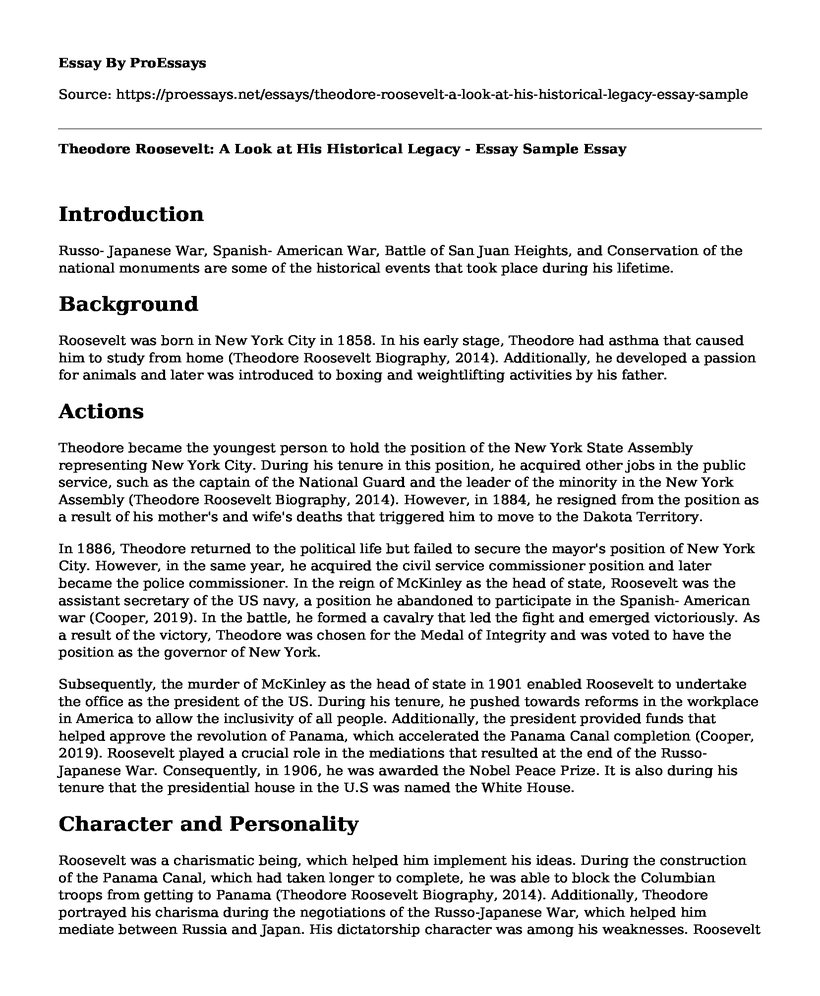Introduction
Russo- Japanese War, Spanish- American War, Battle of San Juan Heights, and Conservation of the national monuments are some of the historical events that took place during his lifetime.
Background
Roosevelt was born in New York City in 1858. In his early stage, Theodore had asthma that caused him to study from home (Theodore Roosevelt Biography, 2014). Additionally, he developed a passion for animals and later was introduced to boxing and weightlifting activities by his father.
Actions
Theodore became the youngest person to hold the position of the New York State Assembly representing New York City. During his tenure in this position, he acquired other jobs in the public service, such as the captain of the National Guard and the leader of the minority in the New York Assembly (Theodore Roosevelt Biography, 2014). However, in 1884, he resigned from the position as a result of his mother's and wife's deaths that triggered him to move to the Dakota Territory.
In 1886, Theodore returned to the political life but failed to secure the mayor's position of New York City. However, in the same year, he acquired the civil service commissioner position and later became the police commissioner. In the reign of McKinley as the head of state, Roosevelt was the assistant secretary of the US navy, a position he abandoned to participate in the Spanish- American war (Cooper, 2019). In the battle, he formed a cavalry that led the fight and emerged victoriously. As a result of the victory, Theodore was chosen for the Medal of Integrity and was voted to have the position as the governor of New York.
Subsequently, the murder of McKinley as the head of state in 1901 enabled Roosevelt to undertake the office as the president of the US. During his tenure, he pushed towards reforms in the workplace in America to allow the inclusivity of all people. Additionally, the president provided funds that helped approve the revolution of Panama, which accelerated the Panama Canal completion (Cooper, 2019). Roosevelt played a crucial role in the mediations that resulted at the end of the Russo-Japanese War. Consequently, in 1906, he was awarded the Nobel Peace Prize. It is also during his tenure that the presidential house in the U.S was named the White House.
Character and Personality
Roosevelt was a charismatic being, which helped him implement his ideas. During the construction of the Panama Canal, which had taken longer to complete, he was able to block the Columbian troops from getting to Panama (Theodore Roosevelt Biography, 2014). Additionally, Theodore portrayed his charisma during the negotiations of the Russo-Japanese War, which helped him mediate between Russia and Japan. His dictatorship character was among his weaknesses. Roosevelt pushed his ideas to be implemented, thus failing to give other people to air their opinions. For instance, during the renovation and renaming of the white house, the president failed to include the participation of other national executives.
Contribution to History
Roosevelt is a significant figure in USA history. Through his participation to end the war between Russia and Japan, he helped to reduce the destruction that would have occurred during the war. Additionally, through the reformation of workplaces in America, Roosevelt brought equality among all the classes in the country (Theodore Roosevelt Biography, 2014). As a result, African Americans in the nation became part of the recognized races in the nation. Theodore participation in the military also led to historical events such as the victory in the Spanish-American War.
Death
Theodore died of coronary infections on 6th January 1919 at the age of 60 years.
References
Cooper, J. (2019). Theodore Roosevelt. Britannica. Retrieved from https://www.britannica.com/biography/Theodore-Roosevelt
Theodore Roosevelt Biography (2014). The Biography. Retrieved from https://www.biography.com/us-president/theodore-roosevelt
Cite this page
Theodore Roosevelt: A Look at His Historical Legacy - Essay Sample. (2023, Feb 27). Retrieved from https://proessays.net/essays/theodore-roosevelt-a-look-at-his-historical-legacy-essay-sample
If you are the original author of this essay and no longer wish to have it published on the ProEssays website, please click below to request its removal:
- The Battle of Normandy - A Research Paper on History
- Slavery in the South Essay Example
- News Frames and Priming of War on Drugs Essay Example
- Essay Sample on Frail Executives: Indicator of Bad Government, Threat to Security
- Myths: Perseus, Zeus and Danae - Essay Sample
- Essay Example on Cold War: Tracing Its Origins to 1945-49
- Essay Sample on Iconographic Characteristics of Egyptian Art







